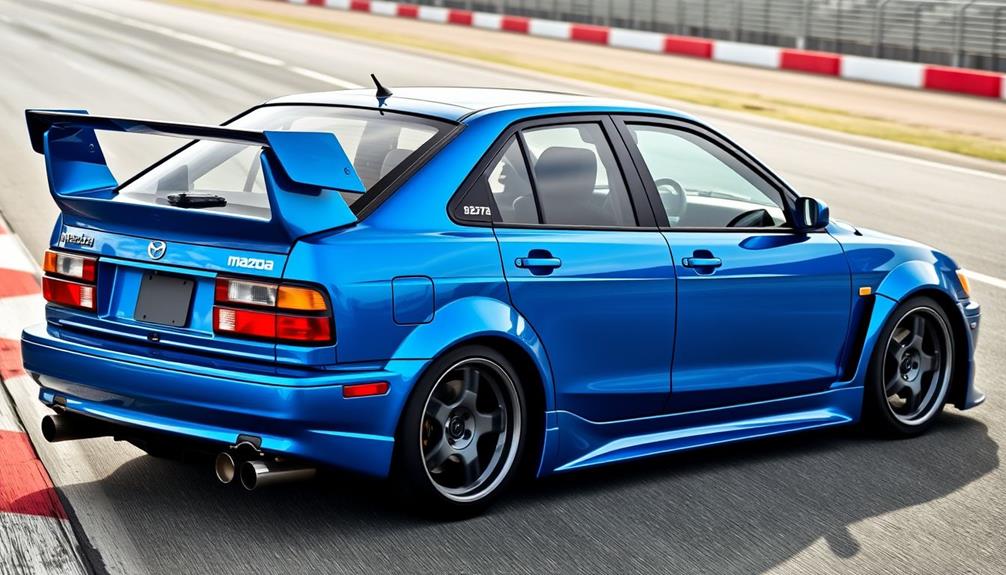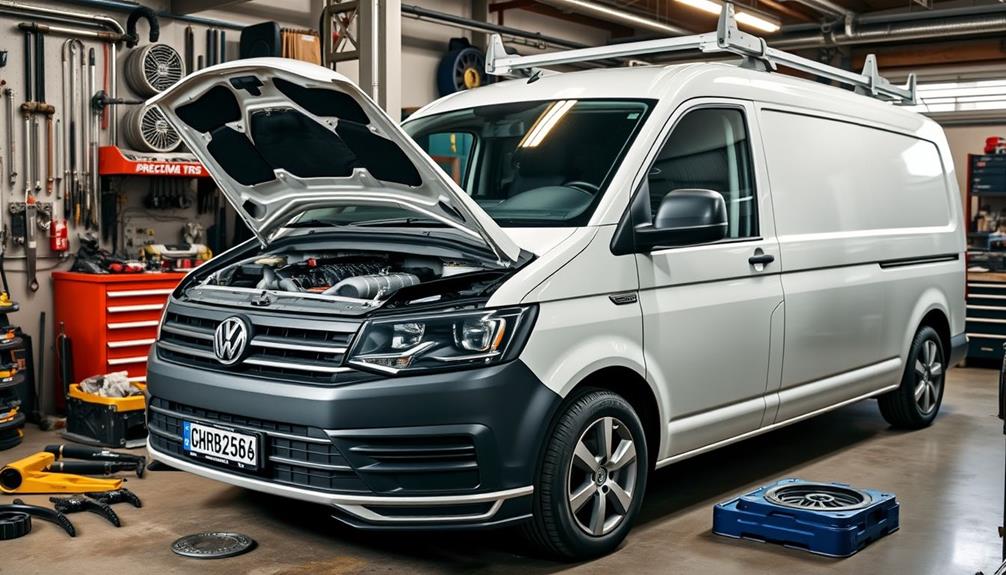Upgrading your 1970 Volkswagen Beetle can give it a modern edge while retaining its classic charm. Start by replacing the stock engine with a 1600cc for a horsepower boost. Enhance airflow by upgrading your carburetor and porting and polishing the cylinder heads. An improved exhaust system will also increase efficiency and performance. Don't forget to check the brakes and suspension to handle the extra power. For those seeking more, consider advanced modifications like forced induction to really elevate your ride. Stick around to discover additional tips for achieving the perfect combination of performance and reliability.
Key Takeaways
- Upgrade the stock engine to a 1600cc for a significant horsepower increase from 44hp to 56hp.
- Enhance performance with larger carburettors and a performance exhaust system for improved airflow and sound.
- Modify cylinder heads by porting and polishing, along with larger valves for better fuel mixture flow.
- Ensure vehicle components like brakes and suspension are upgraded to handle increased power from modifications.
- Seek technical assistance for optimal tuning and to understand costs and compatibility of upgrades.
Engine Upgrade Options
Upgrading the engine in your 1970 Volkswagen Beetle can considerably boost its performance and driving experience. One popular option is replacing the stock 1300cc engine with a larger 1600cc engine, which increases horsepower from 44hp to 56hp. This simple swap can deliver noticeable performance improvements on the road.
If you prefer to keep your original engine, consider installing larger barrels and pistons. You can typically increase the cubic capacity up to 87mm without extensive machining, allowing for a significant power boost.
Carburetor upgrades, like the EMPI 34 EPC or Weber 34 ICT, enhance air and fuel intake, further improving overall engine performance.
Don't overlook the benefits of porting and polishing your cylinder heads. This process boosts fuel mixture flow, while installing larger valves accommodates increased airflow for better combustion.
Finally, adding a performance exhaust system will improve gas flow, enhancing both the sound and aesthetics of your VW Beetle.
With these engine upgrade options, you can transform your classic Beetle into a more powerful and enjoyable ride, making every journey an exciting adventure.
Preparation and Maintenance
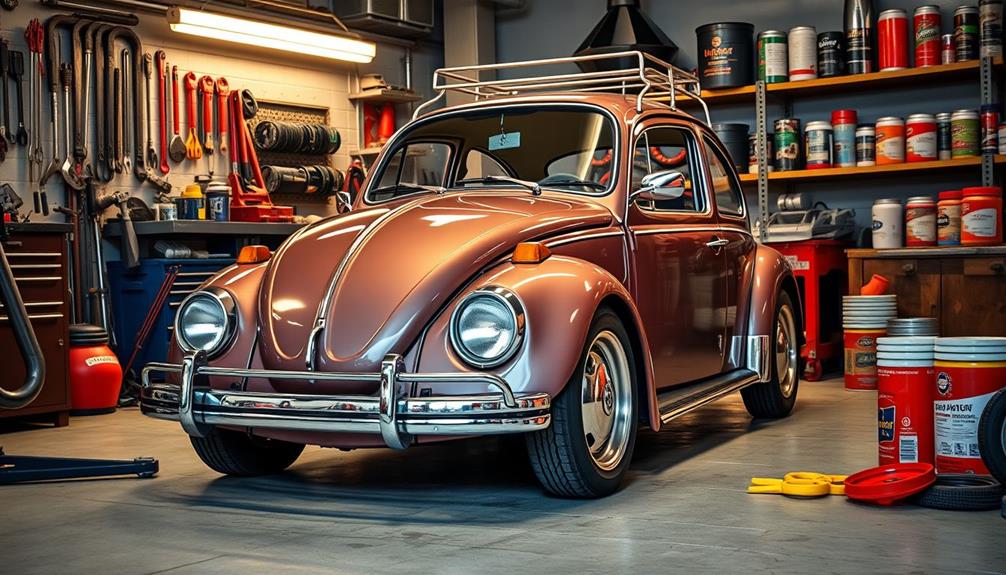
Before you start making performance upgrades to your 1970 Volkswagen Beetle, it's vital to verify that the engine is in good shape. Check for minimal end float and confirm there's no knocking, rattling, or smoking. Completing a recent service on the engine will prepare it for any performance enhancements and affirm that all systems are functioning properly.
Next, assess the vehicle's brakes and suspension. They need to be up to par to handle the increased power from your upgrades. If they're worn, consider renewing them to guarantee safety and stability.
It's also wise to look at upgrading the clutch, as it will need to manage the additional load from your engine upgrade.
Don't forget about regular maintenance on components like the ignition system and fuel delivery. These checks are vital for peak performance and reliability once you've made your modifications.
Carburettor and Fuel System
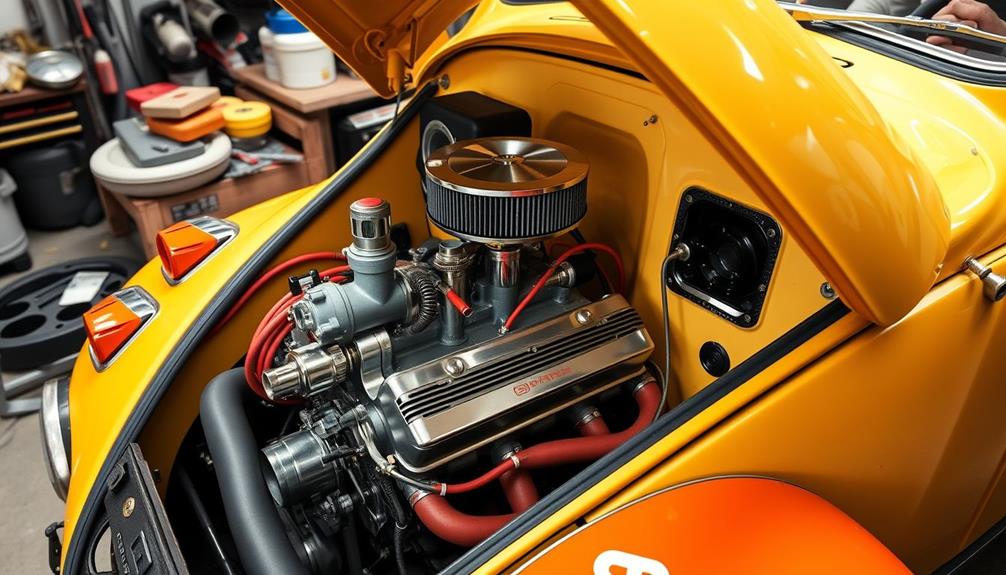
Upgrading your carburettor can greatly boost your 1970 VW Beetle's performance, especially with options like the EMPI 34 EPC for 1600cc-1641cc engines.
You'll also want to think about your fuel delivery system; if you're pushing past 100bhp, switching to an electric fuel pump will keep your engine running smoothly.
Make sure to check the compatibility between your carburettor and inlet manifold to maximize those performance gains.
Carburettor Upgrade Options
Improving the carburettor on your 1970 Volkswagen Beetle can lead to noticeable enhancements in engine performance. For your 1600cc engine, consider a carburettor upgrade with options like the EMPI 34 EPC or Weber 34 ICT. These choices improve air and fuel intake, ensuring your Beetle runs more efficiently.
When selecting a new carburettor, check for compatibility with your intake manifold. For instance, the H30/31 carburettor fits single port manifolds but needs an adaptor for dual-port systems.
If you've got a larger engine build, you might want to explore the EMPI 40 HPMX or Weber IDF carburettors, as they can support higher airflow rates for even greater power gains.
Fuel Delivery Improvements
To enhance fuel delivery in your 1970 Volkswagen Beetle, focusing on both the carburettor and the fuel system is essential. By upgrading components, you'll experience noticeable fuel delivery improvements and a boost in performance.
Consider these key upgrades:
- Carburettors: Upgrading to larger carburettors like the EMPI 34 EPC or Weber 34 ICT can greatly improve air and fuel intake, especially for 1600cc-1641cc engines.
- Electric Fuel Pump: If you plan on pushing beyond 100bhp, switching from the stock mechanical fuel pump to an electric fuel pump guarantees adequate fuel delivery for high-performance builds.
- Inlet Manifold Compatibility: When choosing carburettors, remember that the inlet manifold diameter can limit performance. For instance, the 30PICT/2 fits single-port heads, while the 34PICT/3 is ideal for twin-port setups.
Make sure your fuel system components align with your engine specifications. If you use an H30/31 carburettor with a single-port manifold, you'll need an adaptor for dual-port configurations to maintain compatibility.
Proper upgrades will maximize your Beetle's potential and driving enjoyment!
Cylinder Head Enhancements
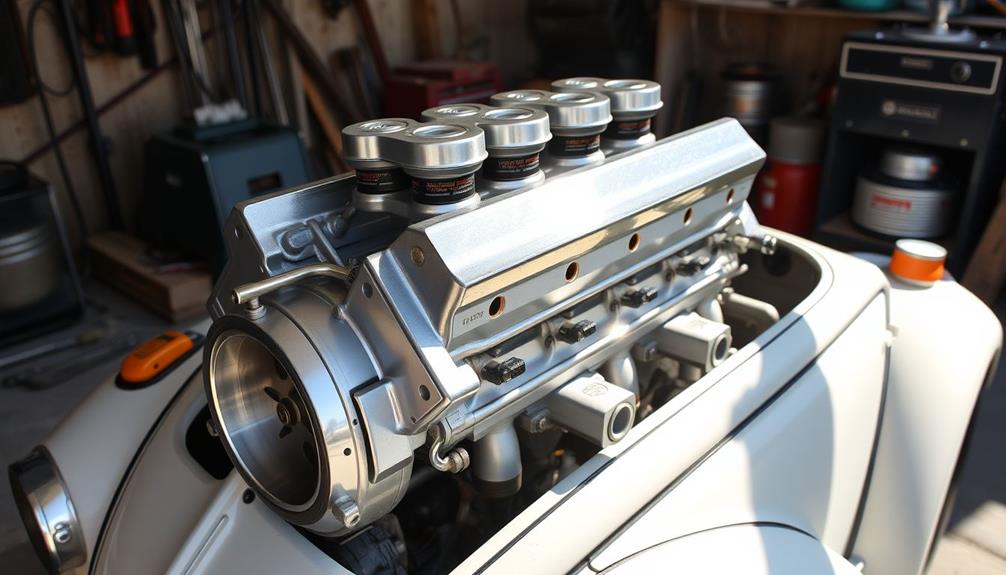
Cylinder head enhancements can transform the performance of your 1970 Volkswagen Beetle, releasing its true potential. One of the most effective ways to achieve this is by porting and polishing the cylinder heads. This process greatly improves airflow, which is essential for enhancing overall engine efficiency and performance.
Additionally, upgrading to larger valves allows for increased fuel mixture flow, critical for maximizing horsepower in modified engines. Investing in performance cylinder heads specifically designed for your 1600cc engine can provide a notable boost in power.
While these enhancements can make a considerable difference, keep in mind that they may require adjustments to the carburetor to fully utilize the increased airflow. To guarantee your engine performs at its best, you might also need to take into account how your exhaust systems interact with these upgrades.
Fortunately, hands-on enthusiasts can often find budget-friendly options for cylinder head modifications. Whether you're a seasoned tuner or just starting, the right enhancements to your cylinder heads can lead to an exhilarating driving experience.
Embrace the opportunity to upgrade and release the true potential of your classic Beetle!
Exhaust System Improvements
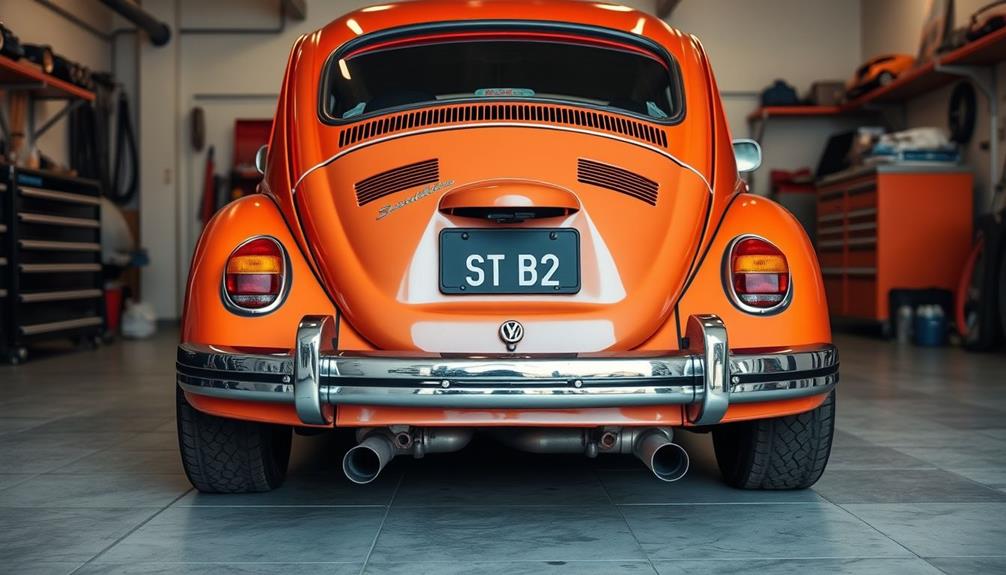
Upgrading your exhaust system can dramatically elevate the performance of your 1970 Volkswagen Beetle. A performance exhaust system enhances horsepower by improving gas flow, which leads to better engine efficiency and response.
One excellent option is to install a merged header exhaust system, optimizing exhaust scavenging for increased power across the RPM range.
Consider these key upgrades:
- Larger diameter exhaust pipe: Using a pipe that's 1.5 inches or more reduces back pressure, noticeably improving performance while giving your Beetle a sportier sound.
- Performance mufflers: Brands like EMPI and Bugpack offer mufflers designed for better flow and a pleasing exhaust note, perfect for tuning projects.
- Aftermarket exhaust systems: Many of these systems fit without extensive modifications, allowing for a straightforward upgrade that can usually be completed in just a few hours.
With these improvements, you'll not only boost your Beetle's performance but also enjoy a more exhilarating driving experience.
Whether you're cruising around town or hitting the open road, a well-tuned exhaust system makes all the difference.
Advanced Modifications and Support

When you're looking to boost your 1970 Volkswagen Beetle's performance, advanced modifications like larger pistons and forced induction can make a significant difference.
It's crucial to evaluate technical assistance options to help you optimize these changes for the best results.
With the right support, you can navigate the complexities of tuning to achieve the performance you desire.
Performance Enhancements Overview
Exploring performance enhancements for your 1970 Volkswagen Beetle opens up a world of possibilities that can greatly elevate your driving experience. By upgrading cubic capacity, you can notably boost performance. The standard crankcase can accommodate up to 87mm pistons without machining, allowing for impressive power gains.
Incorporating forced induction methods, like supercharging or turbocharging, can further enhance your Beetle's capabilities. However, keep in mind potential turbo lag with turbocharged setups.
Here are some key performance enhancement options to keep in mind:
- Engine Modifications: Tuning your engine with compatible parts can optimize power and efficiency.
- Supercharging: Historical options, such as the Judson Supercharger, can provide substantial performance boosts.
- Expert Advice: Seek personalized guidance via email for tailored upgrading strategies.
Making informed decisions on these modifications is essential. Understanding the complexity and costs involved will help you balance performance with reliability, ensuring your classic Beetle runs smoothly.
With the right upgrades and expert support, you can enjoy a thrilling driving experience while retaining the charm of your vintage ride.
Technical Assistance Options
Steering through the world of advanced modifications for your 1970 Volkswagen Beetle can be a complex journey, but you don't have to go it alone. With the right technical assistance, you can make informed decisions about your performance upgrades.
A dedicated technical team is available to provide personalized guidance tailored to your specific needs, ensuring you get the most out of your tuning projects.
If you have questions about engine tuning or want recommendations for supercharging or turbocharging, reaching out via email can lead to valuable insights. It's essential to understand the complexities of these modifications, including costs and compatibility, to avoid overspending while ensuring reliable performance.
Resources are at your disposal to help you grasp important technical aspects, such as cubic capacity increases and the significance of matching engine specifications.
This understanding is critical for maintaining not only peak performance but also the longevity of both your engine and your beloved Beetle. So, don't hesitate to seek assistance; it can make all the difference in achieving your dream ride.
Frequently Asked Questions
How to Increase Horsepower in a VW Bug?
To increase horsepower in your VW Bug, consider upgrading to a larger engine, installing a bigger carburetor, porting and polishing cylinder heads, replacing the exhaust, and enhancing the ignition system for improved performance.
How Much Horsepower Does a 1970 VW Beetle Have?
Ah, the classic charm of the 1970 VW Beetle! It boasts around 50 horsepower from its 1600cc engine. With some tweaks, you can release even more power and enjoy a spirited drive down the road.
How Fast Can a 1970 VW Beetle Go?
A stock 1970 VW Beetle can reach about 80 mph. With performance upgrades, you might increase that speed to 90-100 mph, depending on modifications and factors like aerodynamics, weight, and tire choices.
Can You Tune a VW Beetle?
Imagine your Beetle as a classic vinyl record, waiting for a modern turntable. Yes, you can tune it! Upgrades like better carburetors and exhausts breathe new life into its performance, making every drive a joy.
Conclusion
Upgrading your 1970 Volkswagen Beetle doesn't just boost performance; it breathes new life into a classic. You might worry about losing its vintage charm, but modern upgrades can enhance both style and function. Picture your Beetle with a sleek, custom exhaust and a powerful engine humming beneath the hood—an eye-catching blend of nostalgia and innovation. By investing in these enhancements, you're not just preserving history; you're creating a timeless ride that stands out on the road.

